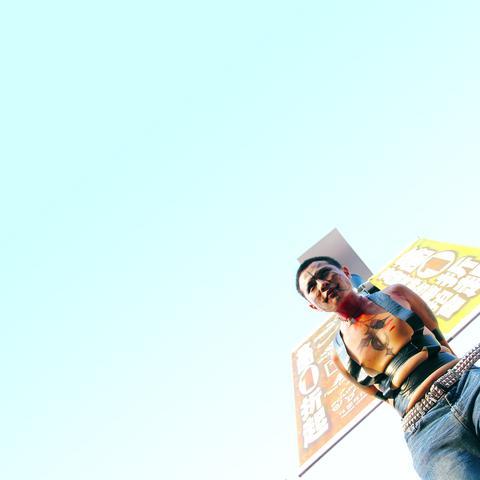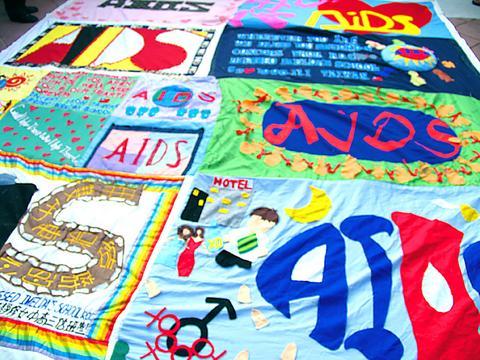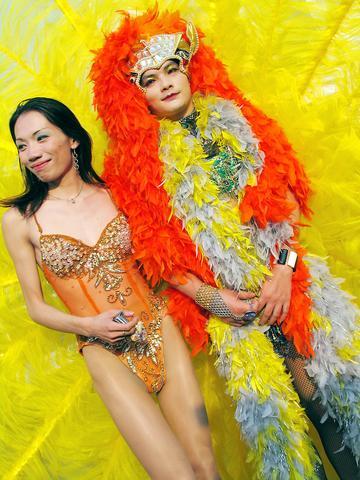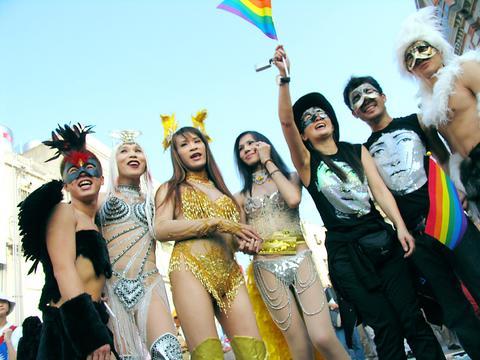Those gathering at Chiang Kai-shek Memorial Hall on Saturday afternoon for the second annual Taiwan Lesbian, Gay, Bisexual, Transgender Pride Parade (台灣同志大遊行) were greeted by admonitions from a Christian group warning homosexuals, "If you do not change your sexuality, you will not enter heaven."
Another group of Christians took a more embracing approach, choosing rather to invite parade-goers to Sunday church services. But while the church took a divided stance, Taiwan's homosexual community chose to unite.

PHOTOS: JULES QUARTLY, TAIPEI TIMES
Organizers estimated around 3,000 people turned up to have their voices heard, their presence felt, and -- because it was a parade -- to fill the streets with music, dancing and bacchanalian revelry.

The parade gathered followers, both gay and straight, as it flowed past 228 Park, a well-known homosexual enclave immortalized in novelist Kenneth Pai's (
One female marcher who joined the party said, "I'm not gay, but I came because I have many gay friends and I want to support them."

Parade organizers from the Taiwan Tongzhi Hotline Association (

Despite fears of facing the media cameras, many young gays came out of the proverbial closet in order to support the Parade and their community.
"I know my parents might see me, but I think it is also important for me to be here," said one university student attending the parade.
Excited photographers captured images of a small minority of parade goers dressed in various costumes, including a group dressed as the holy figure Kuan Yin, a group of young men called the Waterboys clad in just Speedos, as well as drag queens wearing costume jewelery and thick layers of make-up.
What most photographers did not capture were images of followers carrying an AIDS quilt, or quiet homosexual couples marching hand-in-hand, some boasting legally unrecognized unions outlasting many heterosexual marriages.
The fact that the parade-goers did not encounter much societal disapprobation, save the Christian saviors and the occasional annoyed motorist, might cast Taiwan as a gay-friendly Shangri La.
However, when the Parade spilled into the courtyard outside Red Playhouse in Ximending, two homosexuals from Kaohsiung testified to the contrary, reporting frequent police harassment and gay arrests on trumped-up charges.
This testimonial from the south both underscored Taipei's unique position as a liberal outpost in Taiwan and also the need for similar gatherings that will further shed light on existing discrimination.
Following the sober reminders, organizers attempted to rally the group into repeating various contrived chants of resistance borrowed from similar protests rallies around the world. It was a call to action that did not quite pass muster with the crowd. However, pop-diva Sandy Chen (
Other public figures, including university professors and Taiwanese starlets, taped messages that were broadcast on the large screen across from the Ximending MRT station.
DJ Victor Cheng, who mixed records and led the parade on a truck with a sound system, summed up this year's Pride Parade thus: "When my friends try to compare this parade to larger events in the US, I remind them that this is how parades in the US got their start ... the turnout this year proves that the parade will continue to become stronger."
Last year, 1,000 people participated and the larger-scale event this year may indeed bode well for the Pride Parade's future in Taiwan, yet one attendee took a more jaded and perhaps more realistic view of Taiwan's state of affairs. "Society doesn't have a problem with gay people in the public sphere, but when gays enter the home, when a gay is in their family, that's where they draw the line."
True enough, unlike similar manifestations in New York, San Francisco, or Sydney, one did not catch a glimpse of parents out to support their gay children. But reaching that level of acceptance might be a long-term project, or at least an aspiration for the next Taiwan Pride Parade.

The canonical shot of an East Asian city is a night skyline studded with towering apartment and office buildings, bright with neon and plastic signage, a landscape of energy and modernity. Another classic image is the same city seen from above, in which identical apartment towers march across the city, spilling out over nearby geography, like stylized soldiers colonizing new territory in a board game. Densely populated dynamic conurbations of money, technological innovation and convenience, it is hard to see the cities of East Asia as what they truly are: necropolises. Why is this? The East Asian development model, with

June 16 to June 22 The following flyer appeared on the streets of Hsinchu on June 12, 1895: “Taipei has already fallen to the Japanese barbarians, who have brought great misery to our land and people. We heard that the Japanese occupiers will tax our gardens, our houses, our bodies, and even our chickens, dogs, cows and pigs. They wear their hair wild, carve their teeth, tattoo their foreheads, wear strange clothes and speak a strange language. How can we be ruled by such people?” Posted by civilian militia leader Wu Tang-hsing (吳湯興), it was a call to arms to retake

This is a deeply unsettling period in Taiwan. Uncertainties are everywhere while everyone waits for a small army of other shoes to drop on nearly every front. During challenging times, interesting political changes can happen, yet all three major political parties are beset with scandals, strife and self-inflicted wounds. As the ruling party, the Democratic Progressive Party (DPP) is held accountable for not only the challenges to the party, but also the nation. Taiwan is geopolitically and economically under threat. Domestically, the administration is under siege by the opposition-controlled legislature and growing discontent with what opponents characterize as arrogant, autocratic

Desperate dads meet in car parks to exchange packets; exhausted parents slip it into their kids’ drinks; families wait months for prescriptions buy it “off label.” But is it worth the risk? “The first time I gave him a gummy, I thought, ‘Oh my God, have I killed him?’ He just passed out in front of the TV. That never happens.” Jen remembers giving her son, David, six, melatonin to help him sleep. She got them from a friend, a pediatrician who gave them to her own child. “It was sort of hilarious. She had half a tub of gummies,